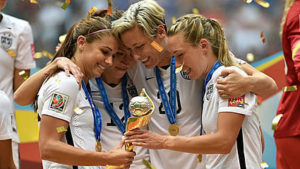
By Anna Goorevich || Staff Writer
Throughout October, there have been many significant developments worldwide regarding the fight for equal pay among female national soccer teams.
The controversy surrounding the lack of equality between men’s and women’s national soccer teams gained traction in March 2016 when the US Women’s National Team (USWNT) filed a federal complaint to the Equal Employment Opportunity Commission (EEOC), which charged the United States Soccer Federation (USSF) with wage discrimination and unequal treatment. The USWNT, at the time, was earning a fraction of what the men earned, despite having won three World Cups and multiple Olympic gold medals while the men’s team had very little success.
This ongoing battle was given a high amount of media attention, especially since many well-known US players, such as Alex Morgan, Carli Lloyd, and Megan Rapinoe, were heavily involved in the conflict.
The USWNT made strides last April when it was revealed that the team and the USSF negotiated a new collective bargaining agreement that would last until December 2021. The new agreement includes an increase in compensation, improved travel and hotel benefits, greater support for players who are pregnant or adopting a child, and more. But despite the long battle, the US Women still did not achieve complete wage equality with the men.
While they did not completely achieve their goal, many international women’s teams have used the USWNT’s example to wage their own pay discrimination battles against their respective soccer federations. In early October, it was revealed that the Norwegian Women’s Soccer team reached an agreement with the Norwegian Football Association, the governing body of Norwegian soccer, to pay the men’s and women’s teams equally, making them the first nation to do so.
This is a significant step for women’s soccer as a whole, especially since the Norwegian FA nearly doubled the wages for the women’s team. Additionally, in order for equality to be possible, it is important to note that the men’s national team contributed a portion of their own salaries to the women’s team, revealing how fully committed the men’s team was to establishing equality between the men’s and women’s teams.
Norwegian player Caroline Graham Hansen expressed her gratitude to the men’s team for helping them to take this monumental step in pay equality through an Instagram post that said, “Thank you for making this step for female athletes. For showing equality and for helping us all.”
Another important development recently regarding women’s pay equality in soccer comes from Denmark, where in September the women on the team forced a cancellation of an exhibition game with the Netherlands due to ongoing disputes with the Danish Football Association (DBU) over equal pay and treatment.
On October 18, the DBU announced that it had pulled its women’s team from their World Cup Qualifying match against Sweden that was originally scheduled for October 20th, due to the players’ refusal to gather after they were disappointed by the lackluster offer that the DBU proposed in their negotiations, which does not provide the players with pay equality.
Days later, it was revealed that the players and the DBU reached a partial agreement that allowed the players to participate in their World Cup qualifying game against Croatia on October 24th, which they won 4-0. The partial deal is only enough to grant the players the ability to participate in the qualifying games which ensures that the team can have the chance to play in the World Cup in 2019. However, the players are pushing for a more formal collective bargaining agreement with the DBU that is more fair.
The DBU will most likely face sanctions from FIFA or UEFA due to the cancellation of the the qualifying game versus Sweden.
The bravery that the female Danish players had cannot be underestimated. By refusing to play in the qualifying match against Sweden, they risk their ability to play in the World Cup in 2019. However, is seems like the player’s refusal to gather for the game added the pressure necessary to force the DBU to negotiate a more fair deal with the women. It is evident that the Danish women are willing to put the success of the team on the line in order to gain wage equality, thereby setting an example for women’s soccer teams across the world.
Teams like the US who have yet to establish full wage equality evidently need to follow the examples and bravery set by Norway and Denmark in order to make greater strides in forcing soccer governing bodies to create more equitable agreements.
First-year Anna Goorevich is a staff writer. Her email is agoorevi@fandm.edu.